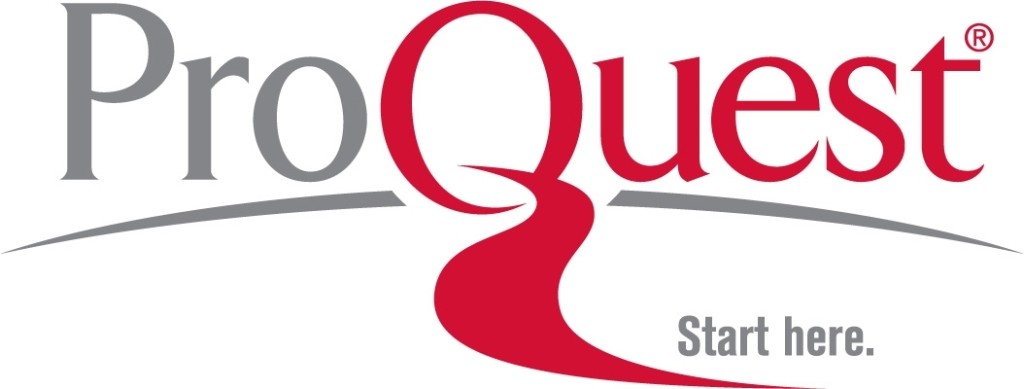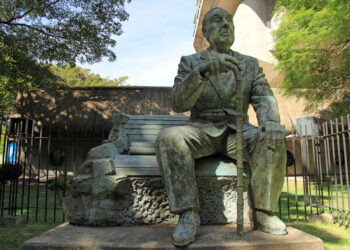 Richard Huffine has worked both sides of the government and industry table. Until recently he was the Director of Libraries for the US Geological Survey (USGS). In May he left the government to become Senior Director, U.S. Federal Government Market, at ProQuest. In October he gave a webinar for NFAIS on the US public access program based on his prior experience and his new perspective from within the vendor community. His slides are a good introduction to that federal program-in-progress and they raise some interestingly deep issues, so I asked to interview him and he graciously agreed. Here is the result.
Richard Huffine has worked both sides of the government and industry table. Until recently he was the Director of Libraries for the US Geological Survey (USGS). In May he left the government to become Senior Director, U.S. Federal Government Market, at ProQuest. In October he gave a webinar for NFAIS on the US public access program based on his prior experience and his new perspective from within the vendor community. His slides are a good introduction to that federal program-in-progress and they raise some interestingly deep issues, so I asked to interview him and he graciously agreed. Here is the result.
Q: Your new focus is the U.S. Federal government market. What kinds of things does ProQuest provide there and who are your primary customers?
A: For nearly any ProQuest information or workflow solution available to libraries and their patrons, including news, dissertations, discovery, linking, and SciTech research collections, we have at least one Federal customer. ProQuest is a partner with government libraries providing information solutions as well as workflow tools for librarians and researchers. U.S. Federal Government customers include military base libraries, tribal and military secondary schools, military academies and other higher education programs. Our federal customers span the full spectrum of regulatory, administrative and research agencies covering about any topic you can imagine.
Q: The new US public access program is large and involves a lot of agencies. Do you see this as a potential new market for ProQuest?
A: The OSTP memo only impacts a few dozen Departments and Agencies – namely those with $100 million in research and development expenditures annually. ProQuest is already a trusted partner with many of the research and development groups within the U.S. government but there is always opportunity to expand our partnerships and extend access to high quality content and workflow solutions through ProQuest. Through its various business units including Dialog, Bowker, Summon, RefWorks, and ebrary, ProQuest is focused on providing the best content and services to improve researchers and librarians outcomes. We don’t see public access programs changing the needs of government researchers. As public access programs are implemented, we do see opportunities to give our customers excellent information solutions regardless of the access models in use.
Q: We are going on ten months of secrecy as far as agency public access plans are concerned. One of your slides suggests that the plans may be put out for public comment early this year. How confident are you of this timing? My understanding is that OSTP has yet to even respond to the agency submissions of their draft plans.
A: The government shutdown in October 2013 set the process back substantially, not just because government workers were furloughed but because the shutdown impacted the timeline for grant awards. One of the key aspects of public access is establishing new requirements for extramural research – research funded by grants and cooperative agreements. The primary focus of many Agencies upon returning to work was to get that process back on track so that universities and other grant recipients could continue to operate and rely on the government funding they need to conduct their research.
Q: You point out that grant and contract language will need to be modified. Given that this language is part of the acquisition regulations; do you anticipate new rule makings in order to change it?
A: The process for implementing these public access plans will involve several layers of policy, guidance, and regulation. In some programs, the changes required will be minor but for others, they may indeed involve new or modified rules that will follow the standard rulemaking process. There is precedence for many of these changes in the National Institutes of Health public access plan and its implementing policy and guidance. New requirements in the 2013 OSTP memo, however, will also include research data which has not previously be included in similar mandates by other funding organizations.
Q: You point to CHORUS as a potential player. The Energy Department has expressed interest in using CHORUS in its PAGES system. How about USGS?
A: CHORUS, or the Clearinghouse for the Open Research of the United States, is an effort conceived by publishers as a solution for Agencies to comply with the requirements identified in the OSTP memo. While I cannot speak to what the USGS will do specifically in implementing their public access plans, it is my understanding that USGS will be participating in a broader Department of the Interior approach to public access. The USGS manages the largest research and development investment in the Interior Department, but the OSTP memo was directed to heads of Departments and Agencies, not to Bureaus and other sub-agency components.
Q: You note that copyright seems to be an open question at this point. The Copyright Clearance Center has hosted free tutorials on public access, so they too are interested. Do you think this is a major issue that must be resolved or something that can safely be ignored for now?
A: I definitely don’t think that anyone should ignore copyright when we are discussing public access to federally funded research. While it is true that work produced by federal employees as part of their daily work is considered to be in the public domain, that does not apply to the vast amount of material that will be addressed in these public access plans. Public access does not implicitly address the rights of the copyright holder; it merely requires that some level of access be permitted without a fee. Licensing structures like Creative Commons allow for authors and publishers to define permissions for distribution, re-use and re-mix as well as identify any rights that are retained by the copyright holder. The minimum level of permissions is something we should all look for when the public access plans are released for public review and comment.
Q: House Republicans are circulating a draft bill called FIRST that would change the public access program in significant ways. Is this a potential problem?
A: Administrative policies and legislative mandates routinely coexist in the government. It is true that the draft FIRST bill does propose consideration of embargo periods that would potentially keep research out of public access for up to three years. The OSTP memo suggested that any embargo be no more than twelve months. The question of embargoes however ignores the growth in Open Access publishing and the Article Processing Charge (APC) model available from many publishers today. It also ignores many publisher policies today that permit deposit of some version of research into institutional repositories upon publication. So while FIRST or a similar bill may impact some aspects of administrative policies, I don’t think it could curtail the continued growth we will see in both public access and Open Access commercial publishing.
Q: Interesting times. Thank you for this interview. Do you have any closing thoughts on where we are and where we are going?
A: It is important to understand that some form of public access policy has been proposed in each Congress for some time now. The success of the NIH Public Access Policy to improve access to research without irreparable harm to the medical publishing industry is a demonstration of what can now be accomplished in other research disciplines.
From an information solutions provider perspective, a public access policy has the most immediate direct impact on primary journal publishers. Although ProQuest has been at the front line of OA, implementing an Open Access dissertation submission program in 2008, and publishing Sustainability: Science, Practice, Policy journal under an OA model since 2005.
It is definitely an exciting time to be working to advance research and supporting research communities around the world. I see great opportunities for publishers and for companies like ProQuest in the evolution of models for scholarly communication that value scholarship, peer review, discovery, curation, and preservation.
Discussion
2 Thoughts on "From USGS Library to ProQuest: an Interview with Richard Huffine on the US Public Access Program"
On the legislative front a massive new US “omnibus” multi-agency appropriations bill that is expected to pass contains a surprise OA provision. It only applies to a few agencies in the Departments of Labor, Health and Human Services, and Education but it mandates public access after just 12 months, with no provision for longer embargo periods. This is a stringent precedent. The full text of the bill is at http://docs.house.gov/billsthisweek/20140113/CPRT-113-HPRT-RU00-h3547-hamdt2samdt_xml.pdf. The OA provision in question is Sec. 527 on page 1020.



